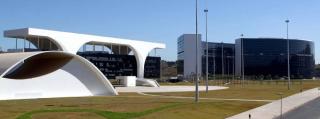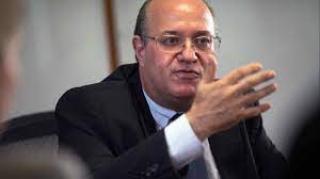Veja Também -
 Pessoas com TEA têm direito à cotas em concursos públicos
Pessoas com TEA têm direito à cotas em concursos públicos Governo de Minas fortalece o uso da linguagem simples
Governo de Minas fortalece o uso da linguagem simples Prefeitura de Montes Claros lança plataforma para emitir alvarás e agilizar construções na cidade
Prefeitura de Montes Claros lança plataforma para emitir alvarás e agilizar construções na cidade Minas Gerais entrega Medalha da Inconfidência a 171 personalidades e instituições
Minas Gerais entrega Medalha da Inconfidência a 171 personalidades e instituições Projeto 'Antes do Voto 2024' chega a Governador Valadares, Montes Claros e Uberlândia
Projeto 'Antes do Voto 2024' chega a Governador Valadares, Montes Claros e Uberlândia- Veja + Revelia News
Revelia News
Postado dia 09/10/2023 às 14:02:53
Triple opportunity could transform Latin America’s fortunes, bank head says

Exports of green energy, food and critical minerals could bring prosperity after years of weak growth
The head of Latin America’s biggest development bank has called on leaders to transform the region’s economic fortunes by seizing opportunities to export green energy, food and critical minerals.
Ilan Goldfajn, president of the Inter-American Development Bank, plans to boost lending by an additional $20bn over the next decade. He believes this would help the region take advantage of the shift to clean energy and a move to bring production nearer to the US market, and respond to citizen demands for better health, education and digital infrastructure.
“This is an inflection point,” Goldfajn told the Financial Times in an interview during a visit to London. “This is not just a narrative, there’s actually an opportunity to be seized . . . we will participate in everything that we can do in terms of renewables and clean energy and clean minerals and things like that.”
With two-thirds of the world’s lithium reserves and 38 per cent of its copper, Latin America could play a sizeable role in providing the world with the raw materials needed to shift to electric vehicles and renewable power, Goldfajn believes.
At the moment, China dominates the market for many of the rare earths and minerals essential for the process, raising concerns among western nations over energy security.
Latin America also has a leading position in global food exports, making it potentially part of the solution to some of the world’s most pressing challenges, the IDB president said. Grain exports have been hit hard by Russia’s invasion of Ukraine.
However, Goldfajn also warned that governments in the region needed to invest in better education, improve productivity and guarantee a stable investment climate to profit fully.
For the region to exploit its abundant and cheap solar and wind power to export green hydrogen, Goldfajn said: “You need to organise yourself, you need to plan, you need to bring the resources, you need to have rule of law, you have to have regulation.” Chile has been a pioneer in this area, with Brazil’s new leftwing government also enthusiastic.
A former head of Brazil’s central bank who also worked at Credit Suisse and ran the IMF’s western hemisphere division, Goldfajn said he would prioritise results over the amounts lent.
Speaking of a hypothetical $500mn digitalisation project, he said: “You approve it and you disburse it and everybody’s happy when you’ve disbursed everything. But now, we want to look at: ‘Tell me how many, then how are you going to measure, how are we going to follow up?’ That’s going to be our measure of effectiveness.” Goldfajn also advocated more co-ordination with other multilateral development banks.
The IDB signed a four-year partnership with the World Bank at the end of August to collaborate on tackling Amazon deforestation, helping the Caribbean manage climate disasters and improving access to the internet for poorer people in Latin America.
“The agreement with the World Bank is a breakthrough,” Goldfajn said. “It’s the first agreement where we don’t just sign a letter of intention saying ‘let’s be friends’. We actually have working groups and we only signed when they came with action plans.”
The IDB was discussing similar co-operation pacts with the Latin American development bank CAF and with the IMF but would only sign deals once clear deliverables were agreed, he added.
Goldfajn arrived at the IDB amid turmoil after his American predecessor, Trump appointee Mauricio Claver-Carone, was fired last September. An external investigation found that the Cuban-American former lobbyist had conducted an undisclosed intimate relationship with a subordinate to whom he gave two large pay rises. Claver-Carone had denied the allegations.
Goldfajn was elected president last November with US support and has moved swiftly this year to rally staff behind a fresh vision for the Washington-based bank.
His team is working on a formal proposal to the 48 shareholder nations for a capital increase for the IDB’s private sector lending arm. This is likely to be in the region of $3bn-$5bn, though Goldfajn would not confirm a specific amount.
That proposal will be made at the bank’s next annual meeting in March 2024, along with a new seven-year strategy for the IDB. This will focus the bank on helping Latin America and the Caribbean adopt clean energy and tackling what Goldfajn terms the region’s triple challenges: governments short of money, populations pressing hard for better public services and the region’s low growth.
New financial tools may help. These could include lending to Caribbean nations which allows a suspension of payments in the event of a climate disaster, or pioneering green loans such as a $1.5bn Uruguay sovereign bond last year. The IDB provided technical assistance on designing the instrument, whose interest rate reduces if targets to cut greenhouse gas emissions are met.
“All the region has problems with climate change,” Goldfajn said. “So there is an opportunity here for the region to seize, to be the ones who invest in clean energy, change the [energy] matrix, export part of it.”
As an example, he cites a $400mn IDB loan made in June to help Chile use its cheap and abundant renewable electricity to build a green hydrogen export industry. “Green hydrogen is booming because you have a lot of demand coming from Europe,” Goldfajn said. “And this is a region which can produce it in a cleaner way . . . We need to seize the opportunity.”




